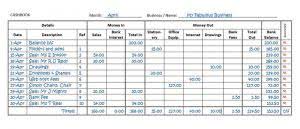Bookkeeping
Enrolled Agent Exam Scoring: What Does the EA Exam Score Mean?
Content

You need to understand each of the exam topics at an intermediate college level. Therefore, you’ll have to go over the content enough that you break the knowledge barrier of basic memorization. You may be tempted to figure out exactly how many questions you must answer correctly to pass, but you shouldn’t worry about it.
- The Part 2 pass rate is a bit more consistent from year to year compared to Part 1.
- In answering questions, candidates should not take into account any legislation or court decisions in effect after December 31, 2022.
- Thus, it is very likely that Gleim is also more popular than Fast Forward Academy when it comes to EA review courses.
- They are led by a popular accounting prep course professor named Brian Hock.
- The first step to becoming an Enrolled Agent is to obtain a PTIN Opens in new window.
- Conversely, almost everyone must work hard to pass the second part–Businesses– so it’s naturally considered the hardest.
Some people speculate that the reason for this drop is a lack of preparation on the part of test-takers, as Part 1 has a reputation for being easier than the other exam parts. Therefore, to give yourself the best chance to pass and overcome the pass rate drop, you must study well and prepare fully. The IRS provides scaled scores and a score report that indicates your performance in each exam part. If you do not pass a particular part, you can retake that section separately without needing to repeat the entire exam. Additionally, candidates can refer to IRS publications, the Internal Revenue Code, and other relevant tax resources to enhance their understanding of tax law and its application. This ensures that they are well-prepared for questions that may require reference to specific tax provisions or regulations.
Taking the Exam
In contrast, the REG exam requires candidates to complete 76 MCQs and 8 TBSs within 4 hours. Conveniently, I have a few readers who are both CPAs and enrolled agents. The 100 multiple-choice questions that make up each exam include 15 experimental questions. The topics of the experimental questions cannot be known, so this breakdown accounts for the remaining 85 questions.
Scoring at least 105 points demonstrates that you have the knowledge to practice before the IRS and deserve all the benefits that come with earning your EA. Depending on your prior education and experience, certain EA exam Part 1 content areas may be more familiar to you than others. To determine which content areas you know well and which ones you don’t, start your EA review with a practice quiz. Then, use the results of your practice quiz to discover and target your weak areas in particular. Focusing on your weaknesses is definitely one of the most effective ways to learn.
Registering for and scheduling your Enrolled Agent exam
It is easy to get a tricky question wrong, even when you understand the material. Despite popular opinion, the EA exam will never ask you to fill out a tax form. Instead, you will put your mastery of tax law to the test as you apply it to a variety of circumstances. Paper, pencil and a calculator will be provided at the test site. Personal items are not allowed in the testing room and must be stored in a locker.
The Enrolled Agent Exam Part 2 is called “Businesses.” Therefore, this exam part focuses on the business side of the tax code. And in the United States, corporate taxation is more complicated than individual taxation. Therefore, due to this singular focus, many EA candidates regard Part 2 of the exam as more challenging than the Enrolled Agent ea exam pass rate exam Part 1, which addresses individual taxes. The IRS doesn’t use a straightforward formula to achieve this conversion from raw to scaled score. So as much as some of you would like to know, I am not able to tell you how exactly this is done. To recap the exam basics, the Enrolled Agent exam has 3 parts with 100 multiple-choice questions each.
CMA Exam
Of these 100 questions on the first part of the EA exam, 86 are scored questions. Furthermore, the IRS does not score the 14 experimental questions. So, your EA exam score for Part 1 comes primarily from those 86 questions. Most people find the most challenging part of their application process to be part 1 of the business.

